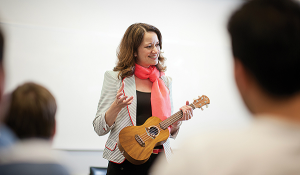
Professor and Vice-Provost Sarah Forgie in the classroomLast fall during Reading Week I was invited to attend an Indigenous Women's Studies class at Vancouver Island University taught by my friend and former colleague, Maxine Matilpi. The rapport already established among my friend and the students was unmistakable. As I walked in the room, I witnessed warm greetings and casual and excited information swapping about upcoming events. Maxine, an experienced dancer and performance artist, began with a poem related to that week's topic. I watched as the energy shifted stunningly. Students moved their bodies forward to listen with anticipation, and all eyes were transfixed on my friend while she read the poem.
This past week, here at the University of Alberta in the Graduate Teaching and Learning session on Lesson Planning/Session Planning, Renée Polziehn spoke about the importance of varying the tempo in one's classroom and "setting the stage" with a hook that shows students why the topic is important. Renée played a video clip that showed how powerfully an anecdote can grab students, and another video of an instructor who had his students sing a Pink Floyd song together - not just sing, but stand up and stomp the rhythm. Can you imagine making your students create a beat and sing together? If the song had a relevant purpose, I just might be crazy enough to try it.
Creative pedagogy can be fun, but it can also be thoughtful and beautiful. Thinking about participatory presentations I'm reminded of a Reconciling YEG event (part of RISE - Reconciliation In Solidarity Edmonton) that I attended last fall. Poet Laureate and métis writer, Anna Marie Sewell asked the audience to breathe the rhythm of her poetry. Like an Indigenous drumbeat, a heartbeat. Huh-huh, huh-huh, huh-huh, huh-huh. We all became part of the piece.
In the GTL sessions, I have been reflecting on how I might create that kind of collective rhythm in the tutorials I'll be teaching this term. Even if I don't actually make the students sing or breathe together, what creative methods can I use to motivate active and critical engagement?
During my Master's degree, I loved being a Teaching Assistant (TA). But I had very minimal training and little idea what I was doing. Thankfully years of work with student and community groups had given me some facilitation skills and I'm generally comfortable speaking in groups. In the end I don't think the tutorials were too horrifying for the students in those first international politics classes. I can guarantee the experience was nothing special.
I got a bit more into a groove when I later became a TA for a free introductory university course. The energy in that class was exactly what a nerdy academic like me wants to believe the university is: engaged, challenging, exciting. This was definitely related to the fact that everyone was there because they wanted to be. The profs and TAs were volunteering and the students weren't getting credit. The program was thoughtfully organized and the TAs received a serious training session and ongoing support. In fact, we were provided with almost all of the activities and questions for the small group discussions we led with students.
Moving forward from these two very different experiences and into my current position as a TA in Political Science, I've found myself trying to chart a path that builds on what I've learned about facilitation and student engagement. So far, I've come up with more questions than answers. I know what interesting activities feel like for students and facilitators, but how can I develop them myself? I know what an engaged group looks like, but how do I create an environment where students are brave and attuned to others? I know what a lively critical discussion sounds like, but how do I formulate the right questions to get it going?
These questions initially inspired me to sign up for the GTL Learning Weeks. Based on the sessions I attended in week one, I already have a handful of new tools that I can use to teach across learning styles and to help better facilitate active and reflective conversations.

Renée McBeth - PhD Student, Political Science
Renée is a PhD student in Political Science at the University of Alberta. Her research is about feminist and decolonial approaches to solidarity-building in antipoverty movements. She has worked with community social justice advocacy groups for more than ten years and feels at home while hiking or somewhere cozy reading a book.